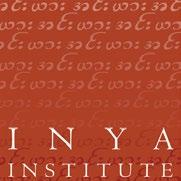

The Inya Institute Quarterly Newsletter

This is a busy time for the institute! Our language teachers are running the 4th year of our language course series: the Kachin language course has ten participants, the Karen course six, and the Shan course five, with a total of seven international participants across the three courses. The commitment of all is unwavering despite the operational challenges! Our Summer 2025 Myanmar’s Borderlands Research and Mentoring Workshop is also in full swing. In early July, six new groups of junior researchers started their eleven-month long participation in the program. They will further develop their skills by working on a topic of their choice ranging from mental health of refugees along the Thai—Myanmar and India—Myanmar borders; the Wa ethnic minority and its struggle for language maintenance; post-coup power shifts and economic instability along the Kachin—China border; or access to education for refugee communities in Bangladesh and Thailand. More on the groups, their background, and research topics on pp. 8—10. As she did in 2023, Dr. Kimberly Roberts is facilitating the workshop. Her expertise in borderland issues and previous mentoring experience will prove highly beneficial to our new cohort of junior researchers. Together with language specialists of the Saint Paul Public Schools’ Karen Language Program (Minnesota), Cornell University’s Southeast Asia Program (SEAP),
In this issue
and University of North Carolina-Chapel Hill’s Carolina Asia Center, the institute is currently supporting the development of teaching materials by a cohort of language teachers specializing in Shan, Kachin, Karen, Chin (Teddim), and Burmese languages. The training will develop the participants’ pedagogical skills and introduce them to the field’s best practices, with the hope that they will share these with their learners—be they non-native speakers or heritage learners. This training follows an online workshop held in mid-June. More on this initiative on p. 11.
And lastly, as part of our partnership with the Myanmar Consortium of Community Colleges (MCCC), we also completed a three-day workshop (July 7-9) on “Curriculum Development Enhancement” with Northeastern Illinois University’s Prof. Claudia Mercado as Lead Facilitator. Held with the support of Chulalongkorn University in Bangkok, the objective was to support our Myanmar partners in the development of their curriculum for a B.A. degree in Community Development. As you will see on p. 12, the experience proved transformative for all participants with productive discussions leading to an action plan and further identification of collaborative strategies. We will hopefully be able to organize another workshop in 2026!
The Inya Institute team in Yangon
Testimony 3 Four Months into the Suspension of USAID funding in the Rohingya Refugee Camps: An Update, by A. Shin Views from the Ground 5 Military Conscription and Responses of Post-Secondary Community Schools, by T. T. Thar & S. L. Pyae Sone Reflections from the Field 7 Notes from the Archives, or “Artificial Intelligence”, by Christian Gilberti On-going Program 10 Recent Activities 11 Upcoming Course 13 New Books on Myanmar 16
Address in Myanmar:
50 B-1 Thirimingala Street (2)
8th Ward
Kamayut Township Yangon, Myanmar
+95(0)17537884
Address in the U.S.: c/o Center for Burma Studies
101 Pottenger House
520 College View Court
Northern Illinois University DeKalb, IL 60115 USA
+1 815-753-0512
Director of Publication:
Dr. François Tainturier
Administrative Assistant: Thin Thin Thar
Digital Resources and Info Assistant: Shun Lai Pyae Sone
Education and Training Manager: Pyae Phyoe Myint
U.S. Liaison Officer: Carmin Berchiolly
Contact us: contact@inyainstitute.org
Visit us on Facebook: facebook.com/inyainstitute.org
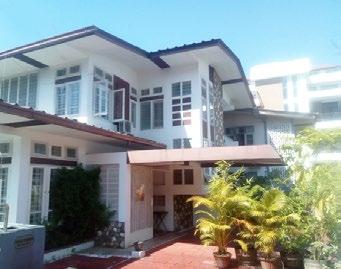
Library: It currently holds a little more than 900 titles and offers free access to scholarly works on Myanmar Studies published overseas that are not readily available in the country. It also has original works published on neighboring Southeast Asian countries and textbooks on various fields of social sciences and humanities. Optic fiber wifi connection is also provided without any charge.
Library digital catalog: Access here.
Working hours: 9am-5pm (Mon-Fri)
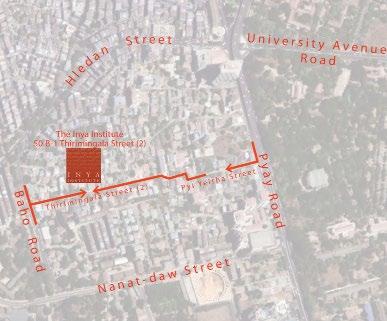
Digital archive: It features objects, manuscripts, books, paintings, and photographs identified, preserved, and digitized during research projects undertaken by the institute throughout Myanmar and its diverse states and regions. The collections featured here reflect the country’s religious, cultural, and ethnic diversity and the various time periods covered by the institute’s projects developed in collaboration with local partners.
Digital archive: Access here
The Inya Institute is a member center of the Council of American Research Centers (CAORC). It is funded by the U.S. Department of Education under Title VI of the Higher Education Act (2024-2028).
Institutional Members
Center for Burma Studies

Center for Asian Research
Southeast Asia Program
Northern Illinois University Arizon State University Cornell University
Center for Southeast Asian Studies
Carolina Asia Center York Asia Center for Reseearch
Northern Illinois University University of North Carolina-Chapel Hill York University
Academic Board
Maxime Boutry, Centre Asie du Sud-Est, Paris
Jane Ferguson, Australian National University
Lilian Handlin, Harvard University
Bod Hudson, Sydney University
Mathias Jenny, Chiang Mai University
Ni Ni Khet, University Paris 1-Sorbonne
Alexey Kirichenko, Moscow State University
Christian Lammerts, Rutgers University
Mandy Sadan, University of Warwick
San San Hnin Tun, INALCO, Paris
Juliane Schober, Arizona State University
Nicola Tannebaum, Lehigh University (retd)
Alicia Turner, York University, Toronto
U Thaw Kaung, Yangon Universities’ Central Library (retd)
Board of Directors
President: Catherine Raymond (Northern Illinois University)(retd)
Treasurer: Alicia Turner (York University, Toronto)
Secretary: François Tainturier
Jane Ferguson (Australian National University)
Lilian Handlin (Harvard University)
Nicola Tannenbaum (Lehigh University)(retd)
Thamora Fishel (Cornell University)
Aurore Candier (Northern Illinois University)
Four Months into the Suspension of USAID Funding in the Rohingya Refugee Camps: An Update
Ahtaram Shin is a multifaceted professional with roles spanning research, journalism, education, social work, teaching and project management, primarily aimed at advocacy and capacity building. His advocacy efforts center around the Rohingya community, with a deep focus on human rights and combatting human trafficking, border cross trading, the future of Rohingya Generation under the shadows of federal democracy in Myanmar and Hepatitis C Virus in Rohingya camp. He was one of the junior researchers participating in the 2023 Myanmar’s Borderlands Research and Mentoring workshop. Ahtaram’s contribution is the second of a three-part series documenting the real-life consequences of the USAID cuts affecting the Rohingya refugees in Bangladesh.
The past few months (April to early July) have seen further closure of public health services following the USAID funding cuts decided in early 2025. According to reports from UNHCR and WFP, approximately 30 Outpatient Therapeutic Feeding Centers (OTPs), 10 Stabilization Centers, and 15 community nutrition sites (supported by ICRC and partners) were closed due to funding shortages. Additionally, around 70 other nutrition centers have been significantly downsized. The distribution of biscuits, dates and other nutrition foods provided with WFP ration has also stopped. The cuts have also severely impacted WASH (Water, Sanitation, and Hygiene) sectors, leading to the shutdown of hygiene kit distribution campaigns and sanitation services in multiple camps. These reductions have exacerbated health and malnutrition risks for Rohingya refugees and mental health stability.
Situation regarding food provision
Despite this context, no effort is being pursued at the institutional level to make up for the loss of food distribution. In particular, there is no additional food distribution from the Bangladesh authorities. Only a few local NGOs provided Iftar meals during Ramadan. In some camps, a Turkish NGO named AFAD distributed rice and other food items on a monthly or weekly basis. Previously, many NGOs provided extra food supplies, but this support has since been discontinued. Since the Rohingya refugees have no livelihood or income sources, they are unable to provide for themselves. There are no viable alternative ways to compensate for the lack of food provisions
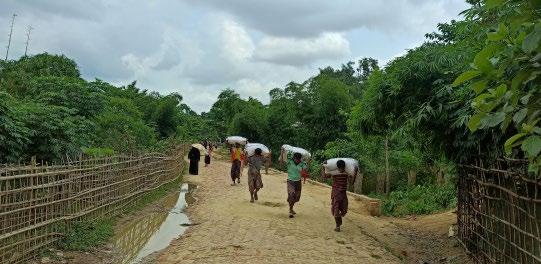
like backyard gardening, as it can be done in other contexts. The Rohingya refugees live in small, cramped shelters with very limited space. There is no available land within the camp perimeters and refugees are prohibited from leaving their camp and unable to farm in the surrounding areas. They are not permitted to trade or work in the host community. Some refugees attempt small-scale gardening on the roofs of their shelters, but the harsh temperatures and pests make it difficult for plants to thrive. However, some have managed to grow spinach in these challenging conditions. But this option is only pursued by few families. Backyard gardening is not a feasible solution for Rohingya refugees as most families lack the necessary resources and room. Some families receive occasional financial support from relatives abroad, but even this assistance is difficult to access. Since Rohingya refugees are not allowed to open bank accounts or use Bangladesh’s formal banking system, receiving money from overseas remains a major challenge.
Accessing educational opportunities for the Rohingya Youth
There are approximately 8,500 Rohingya volunteers and trainers across all the sectors for which support has been provided for the Rohingya refugee communities. This is for a population of one million Rohingya refugees. Volunteer workers and trainers usually receives a stipend which may range between 3,000 taka - 8,000 taka [$24-64] per month. No matter how qualified a Rohingya, they are only allowed to work as volunteers inside the refugee camps.
Religious education is still being provided with approximately 2,000 religious teachers and imams. They work voluntarily and collect charity from refugees once in a year. These religious schools are run by local religious teachers with the support of the communities.
Regarding the education of Rohingya girls, this is limited to girls aged 5 to 12 who can attend primary education. Once they reach adulthood, they stop going
Pic. 1: Rohingya people bringing rice bags from the distribution points.
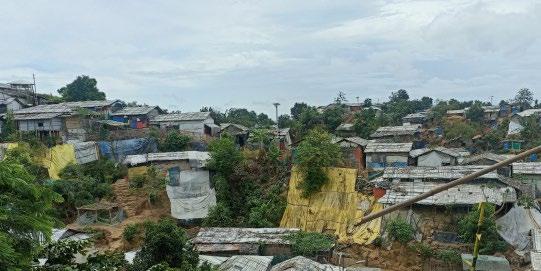
Pic. 2: Typical Rohingya shelters. to school. This was always the case even before the USAID funding cuts. The main reasons are the lack of formal or informal high schools for adult students and concerns over safety and security for girls. Previously, women could access vocational training and skill-based activities through women-friendly spaces. However, after USAID withdrew funding, these programs have nearly ceased, leaving women with few opportunities. Currently, there are no alternatives available for Rohingya women, but there are potential opportunities with home-based projects that could engage them in income-generating activities. These activities include poultry farming, crop cultivation, garment and soap production, mushroom farming, sewing, tailoring, and similar trades. Such initiatives could provide much-needed livelihood opportunities while ensuring safety and cultural appropriateness.
Within the communities themselves, some initiatives are being developped so as to provide education for the younger ones. Some community learning centers offer informal high school education following the Myanmar government curriculum. However, these classes are poorly resourced and operate in home-based shelters, madrasas, cyclone centers, and Islamic primary schools (Maktab) in the evenings from 4 to 8 pm. A few civil society organizations provide vocational and skills-based training programs. Overall, these initiatives remain limited in scale and poor in quality due to funding and logistical constraints. Online education has offered possible avenues for further development. I have participated in several online educational programs, including courses in political and social science from Yangon Cosmopolitan University, a junior research program at Inya Institute, a course on the Rohingya crisis from North-South University, and various courses via the Coursera app. Some
Rohingya youths are also enrolled in online programs through local NGOs, such as BRAC University, University of the People, and Parami University. However, access remains a major challenge due to limited internet connectivity, lack of devices, inadequate living conditions, and insufficient technical support.
For a very limited group of Rohingya young men, overseas studies were once possible. For example, a Turkish university offered scholarships to Rohingya students, with approximately 15 of them currently studying in Turkey. Last year, Japan also granted scholarships to two Rohingya girls. Beyond these rare opportunities, no other countries or universities have extended scholarships to Rohingya refugees. The primary obstacles are the Rohingya's stateless status and the Bangladesh government's restrictions on international travel for study purposes—Rohingya are not permitted to obtain or use Bangladeshi passports for education abroad.
The youths who managed to study in Turkey did so by secretly obtaining Bangladeshi passports. I was also selected as a scholarship candidate for Turkey but could not go after failing the police verification process for passport approval and the entire application process was cancelled.
Access to health care facilities for community members
In my neighborhood, our community has benefited from the following health care facilities: general medical care; maternal and child health; referral service for emergency; and lastly, psychological counselling. However, after the suspension of USAID programs, the situation has dramatically changed. Several health facilities in the camps operated solely on USAID funding, with nearly 34 camp clinics relying on this support. Follow-
ing the funding cuts, these hospitals have discontinued critical services, including Hepatitis C medication, vaccinations, child healthcare, and hygiene kit distributions. Among the affected facilities were specialized mobile clinics known as HEPPA (Health, Education, and Population Program for All), which were entirely funded by USAID and have now ceased operations entirely. These HEPPA mobile clinics previously provided essential treatment for chronic conditions such as high cholesterol, diabetes, blood pressure, hypertension, as well as general illnesses like flu and COVID-19. Mobile support in the form of hospital staff assisting was also available; but this service has been unavailable for the past four months, together with support for newborn babies which has been discontinued. Pregnant women still receive some fair level of service and support but children and elderly people no longer much support.
It is not simply access to health care facilities which has stopped. Similarly, training programs on hygiene and contagious disease awareness have also stopped, along with healthcare sessions. Some community-led groups have taken the initiative to arrange transportation for delivery patients, but this is limited. In the past, NGO-run hospitals provided transportation services, but these are no longer available.
These past few months have been incredibly hard for all Rohingya communities in Bangladesh. While no one in the refuge camps can do much about the shutdown of programs funded by USAID, the Rohingya communities have been also frustrated by the limitations imposed by the Bangladeshi authorities. Many civil society organizations are willing to implement projects, but authorities are not granting them permission. Additionally, there are no donors supporting community-led initiatives or facilitating coordination with NGOs. In reality, the Rohingya people receive no support from NGOs or authorities for social activities.
With UNICEF closing all learning centers and dismissing local and Rohingya teachers, and WFP and Camp in Charge (CiC) reducing food ration to $3.5 per person per month, the situation can only deteriorate. Even the interim government of Dr. Yunus acknowleged the situation. This is probably why the Bangladeshi government is pushing more actively for the repatriation of the Rohingya refugee population back to Rakhine even though the conditions there are not met at this time for a peaceful return.
Views from the Ground
Military Conscription
and Responses of Post-Secondary Community Schools - 2 nd and Final Part
The Inya Institute surveyed four post-secondary community schools to understand how they have been navigating the challenges brought about by the military conscription law enacted last year. The community schools Level Up College (LUC), Pinnya Tagar Academy (PTA), Cherry Myay Academy (CMA), and Tounge La’Yat Community College - Education Gathering Group (EGG) are located in Karenni, Kachin, Shan, and Kayin States and have been offering alternative education for youths in Myanmar for many years.
Our Spring issue discussed the impact of the military conscription on the intake of students at community schools and the students’ mental health. This second and final part discusses safety issues for the schools’ staff and students amid forced recruitments of new soldiers and high economic uncertainty.
Overall, our interviewees explained to us that safety concerns for students were real since the start of the military conscription in April 2024. For CMA, the military once inspected the college as many students stay on the campus. Since then, students’ safety has become the first priority and students were warned not to post any politically sensitive posts on social media accounts and delete any politically related images or documents before they leave school for their service learning. However, since the college was established as a training centre for English language and computer skills, no major issue regarding the students’ and staff’s safety has emerged. The college submits monthly updates to administrators: these include students’ list, NRC Numbers, birth places, ID photos. These monthly updates help students and staff obtain approval letters from the administration office more easily when they have to travel.
For EGG students and staff, safety concerns have remained low as the college maintains good relationships with local authorities. The EGG teacher shared the following,
“We seek to build strong relationships with community administrators and maintain constant communication between our staff and students, and local authorities so to ensure safety and
security. But building these relationships are particularly challenging in this current situation. When building these relationships, the challenge is that our school operates in a community which is not in our native area. Since we don’t have much connections with this local community, establishing trust requires significant time investment.”
For building community trust, the EGG teacher reported that stakeholders and local authorities are invited to the school events. The school also sends invitations to them for Summer programs that it organizes, with the hope their children might want to participate. This approach is pursued as a way to build the school’s reputation as an educational organization. Similar to CMA, PTA only had limited
safety concerns for students since the start of the military conscription. As the area has been unstable since 2021, there has been no permanent administrators whom the school can contact for giving students’ and teachers’ information. Since the military built a new checkpoint at the village entrance, students and teachers who come from Myitkyina or go to downtown are inspected more frequently than before. However, with a temporary military camp located nearby the college compound, the PTA teacher shared the following,
“About a month ago, the military troops garrisoned near our school and fired [a cannon] toward Upper Kachin State, which caused the ground to shake violently, leaving the children in shock.”
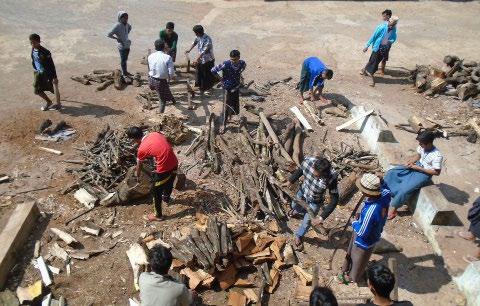
Pic. 1: Cherry Myay’s students volunteering at Lwel Kham Monastery for Dhama School graduation ceremony.
Since then, PTA has drafted emergency plans which consist in bringing students to a temporary shelter located in a field behind the school. However, this can be only temporary. The PTA teacher explained the following,
“If we want to completely secure the student’s safety, we would have to close the school. If we close the school, the donor will ask why the school closes. There is no battle nearby [around Myitkyina] and no immediate military’s threat so it is not possible for us to close the school.”
In the case of LUC, safety concerns among students have remained relatively low following the military conscription as students are prohibited from travelling both locally and overseas. Internship programs are only permitted with organizations located in the school area. But a LUC teacher shared an exception to this rule,
“Students make proposals for organizations welcoming interns. If students suggest organisations outside the area permitted, we may still consider their proposals provided that they have strong connections with these organizations. We will also ensure that their accommodation and travel plans are well defined.”
Status of Funding and Partnership with Civil Society Organizations (CSOs)
All four colleges receive funds provided by their main donor every three months. But due to high inflation, rise in commodity prices, and political insta-
bility, there have been challenges in managing the budget, especially budget for students’ meals, as students come from distant areas and villages, and stay on the campus. All schools mentioned that commodity prices keep rising and the cost of providing meals for students has become very high.
CMA, PTA, and LUC are no longer receiving food contributions from the local community. Therefore, the students’ food portions for each meal have become limited. Unlike the other schools, EGG gets food contributions from the students’ parents and local community. An EGG teacher explained the following,
“In food management, we have to build strong relationships with local community members to receive supply of fruits and vegetables from them; but managing the budget remains challenging.”
PTA receives little support from local communities as the college is not allowed to partner with any other organizations except the main donor. While managing the limited budget provided by the donor, to fulfill basic needs of the college, small projects such as the installation of solar panels, water purifiers and farming initiatives, can be carried out by teachers who have the right qualifications or experiences to lead them. A PTA teacher remarked,
“Over time, we’ve adapted well to these difficulties. But honestly, this situation is truly sad. [...] And sometimes, the president borrows some money from personal friends because the school can’t borrow loans with high interest rates.”
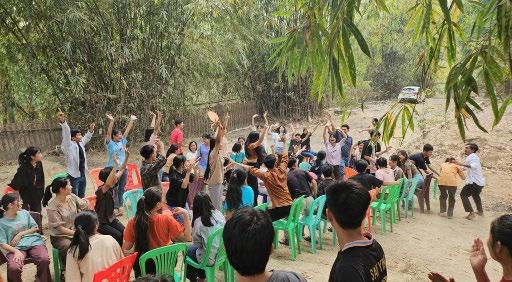
Pic. 2: Pinnya Tagar’s fellowship event.
In contrast to the other four colleges, LUC has been experiencing higher challenges when it comes to managing its budget. Although the college is located in a rural area, the soil is not fertile enough to grow vegetables, and water is in short supply. Furthermore, road communication with the rest of the country has been made extremely difficult due to the bombing of bridges and blockade of roads, causing in turn fluctuations in commodity prices. Stationery and food costs have since then dramatically increased.
All four colleges have been partnering with local NGOs and CSOs. These organizations accept students for service learning and/or internship programs. But since 2021, interviewees from all four colleges mentioned that some local partners within their respective networks have stayed low profile, others have stopped accepting students as interns and service learners, and others left the areas where the colleges are located. The number of opportunities for service learning and internships has therefore significantly diminished. In the case of LUC, the college has maintained good contact with local organizations for their students’ internship program. But seeking internship opportunities in the area where LUC is located remains quite challenging and competitive as there is a number of schools like LUC in the area (border of Southern Shan State and Karenni/Kayah State). Another significant challenge LUC has been facing since mid-2024 is the reduced number of organizations supporting IDPs in the area, all organizations which used to accept LUC students for their internship: many of these organizations have left the area due to security concerns. Regardless of these challenges, LUC has been operating well from its new location thanks to the help of the landowner who allowed the team to use some of his buildings and build new ones nearby.
Despite considerable challenges related to safety and funding, the four post-secondary community schools remain committed to their mission and are preparing to welcoming a growing number of students, even though the ground situation between SAC troops and resistance forces continues to evolve.
Survey conducted and contribution written by Thin Thin Thar and Shun Lai Pyae Sone who wish to thank the schools administrators and their teaching team for their time and assistance.
Reflections from the Field
Notes from the Archives, or “Artificial Intelligence”
Christian Gilberti is a Ph.D. Candidate in South and Southeast Asian Studies at the University of California, Berkeley, working under Penny Edwards. He is currently researching for a doctoral dissertation entitled “Separation Anxieties: The Separation of Burma and India in 1937 and the Birth of a Burmese National Culture, c.1897-1937”. Christian’s dissertation will focus on the growth of an ethnic Burmese cultural nationalism that positioned itself in contradistinction to India in the early decades of the 20th century. This was a complex cultural and political balancing act that ultimately culminated in the separation of Burma and India in 1937. He is also interested in the history of masculinity and dress; imperial exhibitions; local bureaucrats; and the built environment. Christian is a 2024 CAORC-INYA short-term fellow whose research is funded by the Bureau of Educational and Cultural Affairs at the U.S. State Department.
“I don’t know if you know, but we’ve had a cyber attack”, replied the kindfaced British librarian. I did know – it was hard not to know what had happened if you were already working in the British Library (BL), a labyrinthine red-brick building in North London.
In October 2023, a hacker group called Rhysida had attacked the BL’s online systems and were holding them ransom. The hackers wanted 596,000 pounds sterling, but the BL authorities were not about to negotiate with terrorists. Unprepared for an attack of this scale, however, the library staff were left reeling. Many systems were down – call slips and card catalogues were back and everything had reverted to the pre-digital age.
I was there in search of early Burmese printed materials and colonial records relating to Burma in the India Office Records with the help of a generous grant from the Inya Institute.
After going through security that morning, checking my bag and producing my ID numerous times, I had spent the better part of the day identifying records marked “Or. Bur.” that I wished to view. “Let me check,” said the archivist, taking my hand-written call slips. He returned after a few moments: “this is going to sound a bit far-fetched.”
“Try me,” I replied.
The archivist took a deep breath and said, “the records you are looking for are in a sealed building without oxygen controlled by robots”. Because of the cyber-attack, the British Library had been unable to open the building – the robots
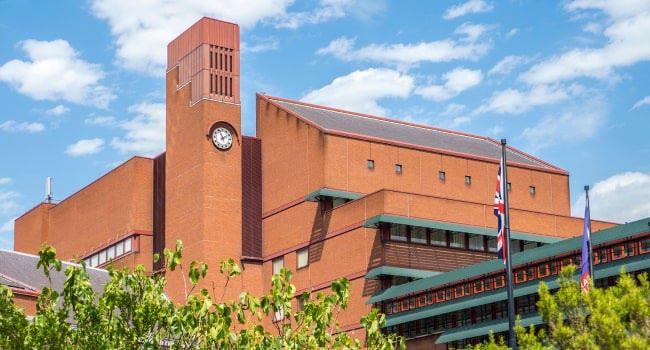
were simply not responding to commands.
By this point in my PhD journey, I had encountered all manner of obstacles. Some were mundane: (allergies, visa woes, archive closures and Byzantine bureaucracy); others not so much (power outages, broken toilets, rabid monkeys, lead plates and termites). I had met librarians who were incredibly gregarious, helpful and funny—true scholars devoted to preserving and archiving knowledge; I had also incurred the wrath of one or two unhinged folks.
In London, I froze; in New Delhi, I was taken to tea; in Dehra Dun, I was given the grand tour; in Kolkata, I stormed out of the reading room after a week of being given the run-around. Things had a way of righting themselves each time – for instance, the next day in
Kolkata I was delivered into the hands of a kindly librarian who helped me out immensely. Such are the natural ups-anddowns of archival research.
But the robots were too much. The librarian sensed my disbelief and offered that the building would likely be open in two months. “I’ll be gone by then,” I said. He shrugged his shoulders. I slunk back to my desk – not so much defeated as perplexed. I knew I would be able to pivot and look at other sources, and indeed, I found many fascinating archival documents in the India Office Records that were useful to my project on the birth of a Burmese national culture under British colonial rule. But, as I sat staring at an oversized portrait of the Nawab of Oudh, I had come face-to-face with a seemingly perennial truism of the research process: expect the unexpected.
Pic. 1: The British Library in London experienced a cyber-attack in October, 2023.
On-going Program
Summer 2025 ‘Myanmar’s Borderlands: Past, Present, and Future’ Research and Mentoring Workshop
The ‘Myanmar’s Borderlands: Past, Present, and Future’ initiative is a 11-month program aimed at better understanding Myanmar’s borderlands and how they have historically shaped, continue to shape, and will contribute to shape Myanmar in the future. The 2025 iteration builds upon the success of our inaugural round held in 2023. As she did in 2023, Dr. Kimberly Roberts will facilitate the workshop. After online morning sessions on research methodology held on June 30-July 4, the six groups of junior researchers are currently working with Kimberly on refining their research topic and planning their research activities that will be conducted during the 10-month period of the project. Here members of the six groups introduce themselves and briefly present their research topics.
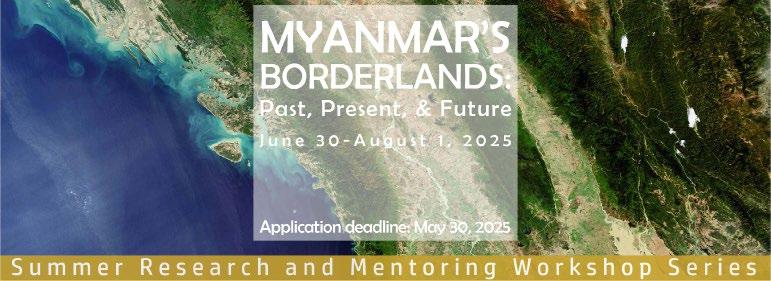
I am Nyein Min Soe from Mindat Township, Chin State, and an undergraduate student majoring in Statistics and Data Sciences at Parami University. I completed my high school in 2020. Since then, I have provided educational assistance in that region through the CSO Academy. I also help students from that region with their university application process if they wish to join Parami University. My lived experience in Mindat township and participation in community development activities have shaped my interest in examining social issues, supporting, and advocating for local communities.
My name is Peter Ling Mang from Mindat Township, Chin State. Since the 2021 coup, I have been active in the education sector as I work as an assistant teacher at Cherry Myay College
in Taunggyi, Shan State. Additionally, I have been teaching English to many students from Myanmar via an online platform operated by the nonprofit organization CSO Academy. I am currently an undergraduate student at Parami University, majoring in Statistics and Data Science (SDS).
We look forward to developing our research on difficulties encountered by ethnic groups, especially Chin refugees, who are currently living along the border of Myanmar and India. Our research will investigate t he basic needs of Chin refugees along the India— Myanmar border and seek to identify which humanitarian assistance is essential and should be provided . The research will fall under the category of ‘humanitarian relief to refugees and public health in borderlands’.
Many Chin people have been displaced to Mizoram, India, due to the 2021 coup. There are also IDPs living near the refugee camps on the Myanmar side of the border. Our research aims to identify the major needs for humanitarian assistance in the refugee camps on both sides of the border. As junior researchers, we will identify the refugees’ needs, analyze the significance and the importance of those needs, and propose suggestions regarding providing humanitarian assistance in the region.
In conclusion, we see this research as suporting advocacy efforts since we were born in the communities that we will investigate and hope to raise public awareness of the pflight of these refugee communities.
Nyein Min Soe - Peter Ling Mang
I am Naw Gay Ler Say, a Karenni woman from Maw Chee, Myanmar. I completed high school in 2015 and joined Level Up College in 2018. I served as a community volunteer teacher at an organization located in a conflict-affected region. My experiences inspired me to move to the Thai—Myanmar border to pursue a higher education program at Deeku Education Center in 2023. I am currently studying at Saint Louis University, Philippines, majoring in Secondary Education. I aim to promote quality and inclusive education, particularly for ethnic youth and children with disabilities in refugee and marginalized communities.
My name is Oo Myar and I am from the Kayah ethnic group in DeeMawSo Township, Karenni State. I graduated from high school in 2019 and then went to the Myanmar Journalism Institute (MJI) in Yangon for a year. After I finished, I
I am Ze Nyoi from Myitkyina, Kachin State. I graduated from Myitkyina University majoring in English. I worked at the Kachinland Research Center as a Research Assistant for three years. After that, I was involved with various CSOs/ NGOs and research fields as a freelancer. I completed a Certificate of Social Research as part of a six-month program offered by the Regional Center for Social and Sustainable Development (RCSD) & Faculty of Social Science, Chiang Mai University, in 2023. As a research assistant, I am currently participating in a research on internal migration to Kachin State for advocacy purposes, building on
My name is Aike Sam. I am a Community Leadership and Research Institute (CLRI) student (Batch 4), living in Tanyang, Northern Shan State. I completed my post-secondary school in Mandalay Phaung Daw Oo monastic education high school in 2017/2018. I have a strong interest in research particularly in the field of education and ethno-history. In 2024, I was involved in a MYEN-led research project focusing on post-coup youth resilience and education in Chin State. Before that, I earned a B.A. degree in Buddhist Philosophy in Thailand. Since then, I came back to my village and contributed my knowledge and skills to my community.
started working as a local reporter for the Kantarawaddy Times. This job helped me connect with people and learn more about the Karenni community. After four years of reporting, I joined the Deeku Education Center to study pre-GED subjects. I then took online courses at the Community Leadership and Research Institute (CLRI). I am passionate about exploring the educational situation for youth in my homeland, as I am one of them.
My name is Alexander Par Reh. I am from Demoso Township, Karenni State, and I work as a volunteer at an IDP camp. I also teach basic computer skills to students in Kay Phoe Du Learning Center. I enjoy helping others and learning new things. I am friendly, kind, and like to work with a team. I want to improve my English, and I love to share knowledge with and support my community. I believe that education can change lives.
prior experience gained from a policy brief paper about economic immigrants in Kachin State published in Kachin language.
My name is M Seng Mai@ Maran Seng Mai and I hold a Bachelor of Economics from the University of Mandalay, Myitkyina Branch. In 2017, I studied English and Social Science at the Community School of the Naushawng Development Institute (NDI). In 2018, I began working at the Kachinland Research Centre (KRC) in Myitkyina, Kachin State. I have extensive experience in social development research, focusing on issues such as drugs, internally displaced persons
I am Su Nandar Htet, a CLRI Batch-4 alumni from Mandalay. When student at CLRI, I conducted research into poverty experienced by women in Karen State. Since I am passionate about women empowerment and community development, I have worked as a program assistant for women empowerment and gender equality at a local NGO, Purple Feminists Group (PFG) in 2024. I have been volunteering as a program leader and executive coordinator at a non-profit U.S. based organization, Youth Society for Education (YSE) since 2022. Currently, I am volunteering as a host for Touchstone discussions and Toastmaster clubs in Jefferson Centre Mandalay. I graduated from
We are very excited to join this innovative Summer 2025 Myanmar’s Borderlands Workshop. Our group is exploring the challenges Karenni youth face in accessing inclusive secondary education in Thai—Myanmar border areas, specifically in Karenni Refugee Camp 1. As conflict, displacement, and poverty continue to affect borderland communities, many young people face high dropout rates, mental health struggles, and limited access to quality education. Drawing from lived experiences and community involvement, our research aims to understand the social, legal, and economic barriers, including lack of legal documentation, shortage of trained teachers, minimal learning resources, and financial constraints. This research aims to amplify marginalized voices and contribute to community-led solutions for equitable education in conflict-affected border regions.
(IDPs), gender development, politics, and the Kachin—Shan—China borderlands. Our research focus is on externalized economic development of borderlands for this Summer 2025 Myanmar Research and Mentoring Workshop. We will study post-coup economic and livelihood changes along the Kachin—China borderlands, exploring how shifting power dynamics, particularly involving the SAC, China, and Kachin ethnic armed groups, impact local communities. Through this program, we aim to strengthen our research skills and contribute meaningful knowledge and policy insights for borderland communities.
Mandalay University with a Bachelor’s Degree in International Relations in 2019. I am Naw Teresa Shalom and a proud Karen woman with connections with four sub-Karen communities. I am enthusiastic about education and community empowerment. I completed high school in 2019. I earned a B.A. degree in Communicative English in 2024, a year during which I also worked as a part-time operations staff member and supervisor to gain organisational skills. After graduation, as I wanted to work full time, I worked as an MEL assistant on a short-term project. Recently, I have been working as a freelance English teacher and attending the TKT to develop my teaching skills.
Naw Gay Ler Say - Oo Myar - Alexander Par Reh
Ze Nyoi - Marang Seng Mai
Aike Sam - Su Nandar Htet - Naw Teresa Shalom
We are enthusiastic about joining the Myanmar’s Borderlands: Past, Present & Future workshop as junior researchers. Though our team members are currently living in different regions, we are collaborating for a research on the challenges
and struggles faced by Wa ethnic minority groups in Tanyang regarding the use of their own Wa language We aim to investigate the challenges and the barriers which prevent the community from preserving its ethnic language.
Furthermore, we expect to produce a concrete set of recommendations that Wa community leaders, youths, and parents may follow as a way to counter the gradual loss of Wa language.
I am Yatanar Oo, a junior researcher and dedicated healthcare professional with a strong background in nursing education and humanitarian work. I hold a Bachelor of Nursing Science from the University of Nursing, Mandalay. I also completed the Diploma of Community Leadership and Research (CLRI), Thabyay Education Foundation. My past experience includes co-authoring a research report on the challenges faced by internally displaced children in Karenni State. Through my clinical and teaching work, I continue to advocate for inclusive education and community development, particularly amid the civil war in Myanmar.
My name is Su Mon Oo, a junior researcher from Southern Shan State and of Pa-O ethnicity. I started a Bachelor of Sciences at Taunggyi University in 2019 but haven’t been able to complete it yet. I also earned a CLRI Diploma. During that time, I conducted some research related to child education in Karenni State. I am a resilient, enthusiastic, and community-
I am Lin Thiha@Muheddin, originally from Maungdaw, Rakhine State, but currently living in Bangladesh. I studied psychology and completed my second year at Yangon Distance University. I have completed several online courses and a diploma in research, human rights, peace education, and democracy. I am a dedicated humanitarian worker, currently serving as a field researcher for Rohingya Youth Empowerment since 2024. I have previously worked with organizations such as PDI, SCI, and CFSI. I am especially passionate about reconnecting youth with their land, culture, and voices through art, storytelling, and community-led education.
I am Bulla Muhe from Maungdaw, Rakhine State. I have worked in the education sector since 2017 serving in various capacities. I completed high school and expanded my knowledge through online training in human rights, politics, psychosocial support, and gender-based issues. I’m passionate about community empowerment and have contributed to
driven individual, passionate about researching and dedicated to making a positive impact. I am eager to work as a social worker and actively contribute to the well-being of my community.
I am Naw Thae Lay Wah, a young researcher who is passionate about social issues and community development. I passed the matriculation exam in 2018 and studied Electronics at the Technological University in Maubin, Ayeyarwady Region. Later, I shifted my academic path and recently obtained my Diploma at CLRI. I am committed to advocating for the rights of vulnerable populations and aspire to work closely with them to support their needs and voices.
My name is Par Zing, a junior researcher who is passionate about community development. With a Bachelor degree in Community Development, I focus on issues related to digital inequality, access to education, ethnic diversity, and youth empowerment in post-crisis contexts. I have led two research projects focused on
research on Rohingya issues. I joined this workshop to strengthen my research skills and to support displaced communities currently living along the borders of Myanmar.
I am Mohamed Faisel, and I am currently working as a research assistant with Rohingya Youths Empowerment. I have a strong background in data collection, analysis, academic writing, and community engagement. I am currently enrolled in the Bachelor of Arts in English Literature program at Yangon Distance University, and my academic journey has sharpened my communication, critical thinking, and research skills.
We are pleased to join the Summer 2025 Research and Mentoring Workshop Series with a research on education access in conflict-affected areas and marginalized communities in Myanmar’s borderlands and a focus on Northern Rakhine and Rohingya communities in Bangladesh. Conflict and displacement have severely disrupted
“The Role of Social Media in English Language Development among Non-native Speakers in Chin State,” and “The Impact of Parental Support on Student Engagement in Education: An Empirical Study on Myanmar IDPs Students at Shhimmui School in Mizoram” during my volunteer work in a Myanmar refugee camp in Mizoram.
Our research topic is about psychosocial challenges and support systems among youth in refugee camps on the Myanmar Borderlands. Psychosocial well-being plays a vital role in helping human beings to function effectively in their daily lives, especially among the refugee community. Thus, it is essential to investigate these issues: we propose to identify the mental health challenges faced by refugee youth and examine their access to support systems that can help them to overcome those challenges within the camps. We hope to contribute valuable insights that can inform youth’s needs related to psychosocial support.
education systems in both regions. Rohingya communities face multiple barriers due to insecurity, poverty, and statelessness, with limited or no access to formal education. Many children cannot attend school regularly.
Though informal learning centers exist, they are often unstable and shortlived. Teachers frequently lack training and support, reducing education quality. Limited humanitarian access further challenges education delivery. Children in camps and informal settlements are especially vulnerable to dropping out, missing both learning and essential psychosocial support.
We seek to address the need for community-led education and inclusive policies reflecting the lived realities of displaced and stateless groups. Strengthening local teachers, using culturally relevant, multilingual curricula, and offering flexible learning pathways are key. Our goal is to inform education interventions and advocate for safe, equitable, and sustainable access for all children.
Yatanar Oo - Su Mon Oo - Naw Thae Lay Wah - Par Zing
Lin Thiha@Muheddin - Bulla Muhe - Mohamed Faisel
Recent Activities
Training of Language Teachers on June 13-15, 2025
Language teaching in the U.S. has developed within a robust institutional framework represented by the American Council for the Teaching of Foreign Languages (ACTFL). In the case of Southeast Asian languages, this framework has further strenghtened through the collaboration of universities with departments focusing on specific Southeast Asian Languages and the establishment of the Southeast Asian Languages Council (SEALC) and the Council of Teachers of Southeast Asian Languages (COTSEAL). Perhaps less visible to the general public have been also the heritage
language teaching programs for diaspora communities. One such a program is the K-12 Karen language program set up by the Saint Paul Public Schools (SPPS) in Minnesota. Opened in 2024, the program has a double objective: (1) to provide dual licensure for Karen language teachers working within SPPS; and (2) to offer instruction in Karen language to Karen school children seeking to maintain their Karen language skills, particularly in reading and writing).
This diversity of programs and institutions—and the underlying infrastructure they represent—formed the backdrop of
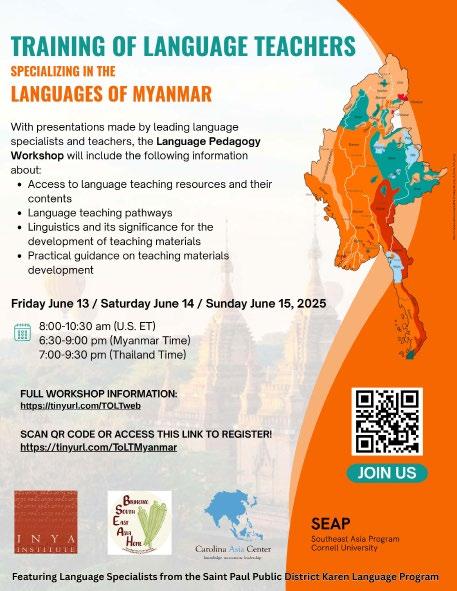
a Training of Language Teachers workshop co-organized by the University of North Carolina-Chapel Hills’ Carolina Asia Center, Cornell University’s Southeast Asia Program (SEAP), and the institute. Held entirely online on June 13-15, its purpose was to introduce the best teaching practices to language teachers specializing in the languages of Myanmar. The turnout was significant with 60+ teachers joining the workshop from Southeast Asia and North America. The workshop featured the following presentations:
• Introduction to Heritage Language and Language Teaching, Dr. Kanjana Thepboriruk, Northern Illinois University, SEALC, and COTSEAL;
• The Critical Role of Collaborating on Language Teaching Pedagogy: COTSEAL’s and SEALC’s Experience in Language Instructor Development Workshops, Dr. Agustini, University of Michigan and COTSEAL;
• Understanding Proficiency and Assessment in Language Pedagogy, Dr. Erlin Barnard, University of WisconsinMadison and SEALC;
• Effective Unit Design for Teaching World and Heritage Languages: Proficiency, Performance, and the Interpretive Mode, by Megan Budke and Ehtalow Zar, Saint Paul Public Schools’ Karen Language Program;
• Effective Unit Design for Teaching World and Heritage Languages: The Interpersonal and Presentational Modes, by Megan Budke and Ehtalow Zar, Saint Paul Public Schools’ Karen Language Program.
Our initiative is now moving to Part 2 of the training. This second phase will extend for six months and will consist in the production of teaching materials by two groups of language teachers under the supervision of Ehtalow Zar, a member of SPPS’ Karen language teachers’ team. One group will include language teachers teaching Myanmar, Shan, Kachin, and Chin (Teddim) languages while the other group will only have Karen language teachers. More about Phase 2 in our forthcoming issues!
Recent Activities
Curriculum Development Enhancement Workshop, Bangkok,
July 7-8-9, 2025
On July 7-9, the Inya team co-hosted a three-day hybrid workshop on curriculum development enhancement with the support of Chulalongkorn University, Bangkok. The workshop marked a further step in the partnership between the Myanmar Community College Consortium (MCCC) and the Inya Institute. The partnership seeks to enhance the capacity of community colleges to develop curricula focused on inclusivity and educational equity as the community colleges transition from two-year diploma-granting community schools to community colleges granting an Associate of Arts degree and eventually a four-year Bachelor of Arts degree in Community Development. In this transition, the partnership seeks to build these community colleges as a model of post-secondary educational institutions in Myanmar.
The MCC Consortium includes the following four community colleges: Cherry Myay Academy (Taung-gyi, Shan State), Level Up Academy (Loikaw, Karenni State), Pinnya-Tagar Academy (Myitkyina, Kachin State), and Tounge La`yat EGGAcademy, Hpa-An, Karen State). On pp. 5-6 of this issue, more can be read about how the four community colleges are navi-
gating the current political crisis, especially after the military conscription law was enacted in 2024. All four community colleges cater to students aged 18 and above. Some obtained their matriculation from government schools while others, unable to obtain matriculation, still seek to pursue postsecondary education within Myanmar. In the aftermath of Myanmar’s military coup, not all students are able to leave Myanmar for such educational pursuits.
To facilitate the workshop, the Inya team invited Prof. Claudia Mercado, Interim Vice-President for Enrollment, Northeastern Illinois University. Prof. Mercado earned a Doctorate and Master of Science in Higher Education Administration from the University of Kansas. Her main responsibility as the workshop’s Lead Facilitator was to assist MCCC representatives in the formulation of their draft B.A. degree curriculum in Community Development through an iterative process that will help them address the needs of PSCS students in the best possible terms.
A review of the existing materials produced by MCCC had been conducted over two online sessions organized in May and June 2025. With the three-day work-
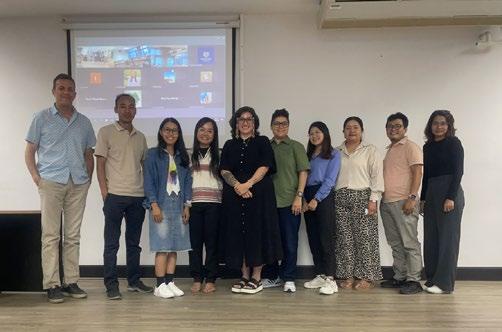
shop held in Bangkok, Prof. Mercado, the six MCCC representatives and their colleagues joining remotely, and the Inya team could discuss hands-on approaches for curriculum development enhancement.
Day 1 centered on ‘Visioning & Framing the Future’ with lively discussions and clarifications on what the partners seek to achieve in terms of core skills, equity, access, and scalable design. These discussions helped participants identify what courses should be part of the core curriculum and those part of the electives.
Day 2 focused on designing the curriculum and assessing the capacity and role of faculty. Both tasks helped to clarify how the transition from one credential to another would be made.
Day 3 involved discussions on the implementation of next steps and commitment to an action plan.
Overall, many questions from our Myanmar partners were asnwered and clarifications made. A clearer path toward their ambitious plan of launching their B.A. degree in 2028 was laid. We will offer updates to this initiative in our future issues.
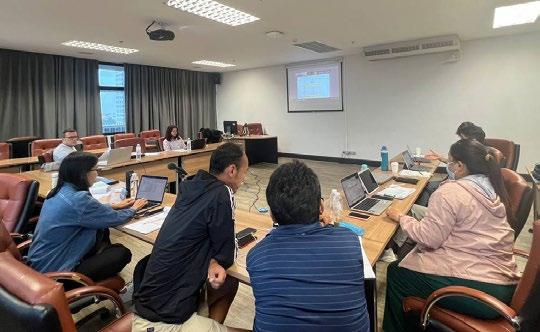
Pic. 2: In-person and online meeting hosted at Chulalongkorn University, Bangkok.
Pic. 1: Prof. Claudia Mercado and Carolina Huerta (center); and representatives of the MCCC and the Inya team.
Upcoming Course
Co-creating a Curriculum for a Training Course on Problem Solving Skills
Pyae Phyoe Myint, our Education and Training Manager, has been running free online training courses—Effective Learning Strategies and Critical Thinking Skills and Decision Making—for youths since July 2023. Her new short-term training course will focus on problem solving skills and is expected to start the last week of July over a five-day period.
For this new short-term training course and since late February, Pyae Pyae has been designing the curriculum in collaboration with three new interns: Thandar Lin, Niang Mary Aung, and Swam Pyae (All three interns were featured in the Summer issue of this newsletter).
This training course aims to equip young adult learners with a comprehensive understanding of analytical and logical ways of thinking in solving problems or challenges they may face in their academic and/or professional activities. The course will include, first, a general introduction of key concepts and, second, practical sessions on how to apply these concepts. Overall, the learning gained will be useful for activties such as research, project development and management, and reporting writing.
In the process of designing the curriculum, the three interns are mainly responsible for reviewing related literature reviews and identifying key concepts as they are related to the course description. As they themselves are in the age group of target participants for the course, they can assist Pyae Pyae in identifying examples, practical exercises for each topic and lesson, and relevant communication techniques for presenting these examples. The three interns typically share what they have learned from reviewing literature at bi-weekly meetings in which they are encouraged to freely discuss their ideas and examples for practical exercises.
As the collaborative work enters its fourth month, the three interns report that they are now aware of the fact that they need to find the root cause(s) of the problem(s) they address, not just solving its/their symptoms. All three interns mentioned that Pyae Pyae’s guidelines on how to take notes and read literature reviews has been of tremendous help.
Regarding the process of curriculum development, they have learned different important points in the first three months of this internship. Swam Pyae confirmed
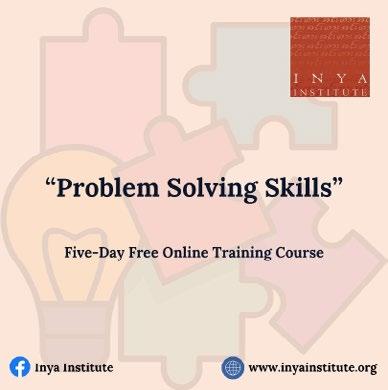
that “it is important to firstly understand the targeted audiences [course participants] who might be from different age groups and then adjust the curriculum in terms of methods of teaching and exercises.” While developing the course curriculum, Thandar Lin “realized that the most important point in developing the curriculum is to understand the main purpose of the course and then consider which approach should be used for targeted participants.” As for Niang Mary Aung, she remarked that “a curriculum development specialist should have sound general knowledge of different fields of studies beyond the specific content knowledge of the course topic. It is really helpful when it happens to think of different examples and ways to get solutions.”
Pyae Pyae and the three interns are now designing the curriculum with examples taken from different contexts such as academic and professional fields and related to environmental and socio-economic issues. This five-day online training course will be offered in Myanmar language and open to anyone. Stay tuned to our Facebook page for the announcement of this new course!
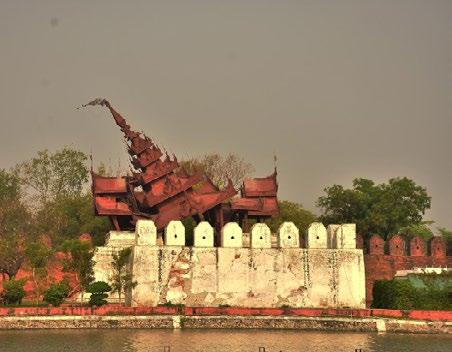
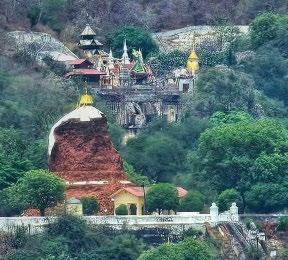
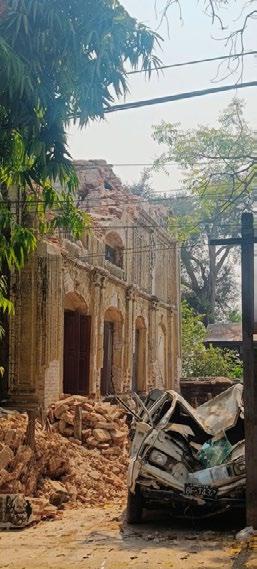
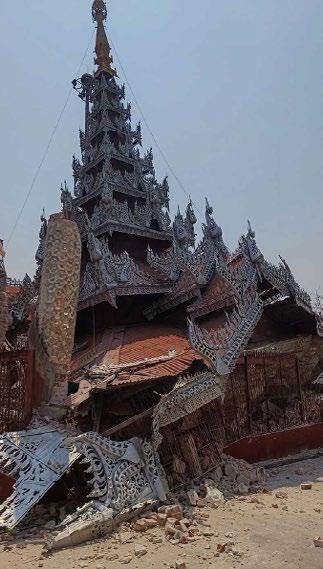
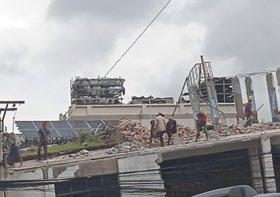
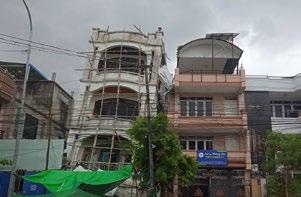
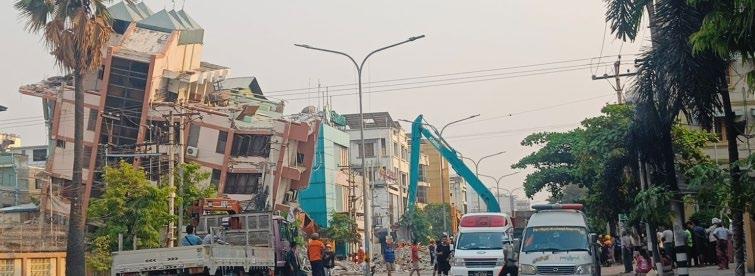
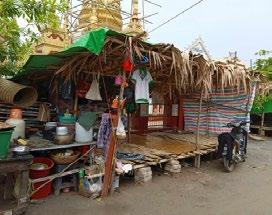
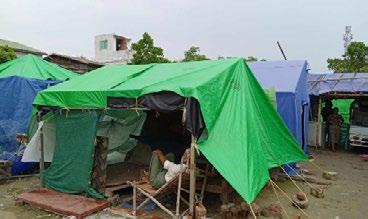
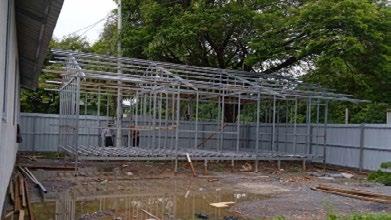
Recent Event
As the World Monuments Fund (WMF) and Silpakorn University, Bangkok, celebrate the teak farmhouses of Myanmar and their traditions through the first exhibition of its kind, a series of lectures is held throughout the month of July.
On July 14, Dr. Francois Tainturier presented a talk on “A Comparative Perspective on Wooden Architectural Traditions and their Developments in Myanmar and Cambodia since Ancient Times”.
If you happen to be Bangkok on July 25, don’t miss Thweep Rittinaphakorn’s talk on Burmese domestic life at Silpakorn!

Annual Membership
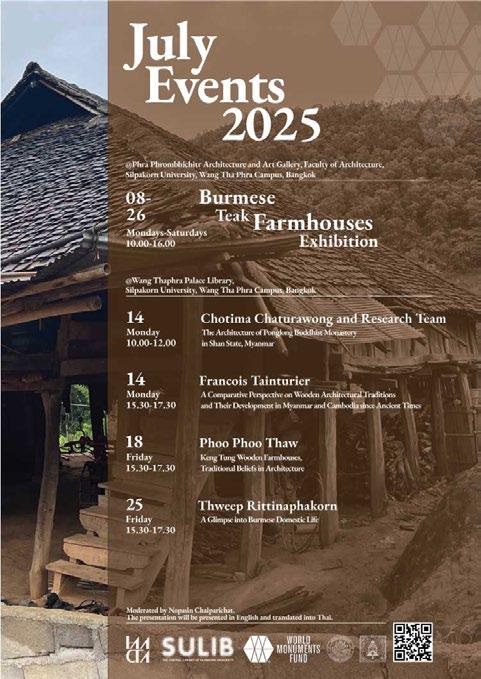
Membership of the Inya Institute is now available for Institutions as well as Individuals!
Despite Myanmar’s current multidimensional crisis, the Inya Institute continues to operate in Yangon providing educational and training opportunities to Myanmar students, supporting scholarship by Myanmar and International researchers in Myanmar and in third countries, and offering language learning opportunities for those interested in Myanmar’s linguistic diversity. It is also one of the few libraries currently open to the public in Yangon. Interconnectedness between Myanmar, the U.S., the Myanmar diaspora in the U.S. and elsewhere is more important than ever and the institute is keen to support this value as shown by its activities listed above. You can be part of this so please consider becoming a member of the Inya Institute! Contact us at: contact@inyainstitute.org
I NSTITUTIONAL MEMBERSHIP
Any recognized academic or educational institution in the United States or Canada may become an Institutional Member of the institute. If a representative of an institutional member chooses to send a delegate to serve on the board of directors, he/she has an opportunity to shape the institute’s programs and activities.
Other benefits include: (1) Recognition of institutional member status in the institute’s quarterly newsletter; (2) Publishing of members’ scholarly events in the institute’s quarterly newsletter; (3) Invitation to join online events, including conferences and webinars, organized by the institute.
Annual institutional membership dues are $400.
I NDIVIDUAL MEMBERSHIP
Anyone may become an Individual Member of the institute, upon application and acceptance by the institute.
Benefits: (1) Inclusion in the institute’s listserv of those institutions and individuals receiving the quarterly’s newsletter; (2) Invitation to join online events, including conferences or webinars, organized by the institute; (3) Reduced fees for the language learning opportunities developed by the institute.
Annual individual membership dues are $25.
New Books On Myanmar
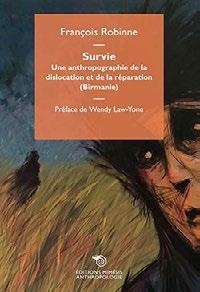
Survival: An Anthropography of Dislocation and Repair (Burma)
François Robinne IRASEC, 2025 (in French language)
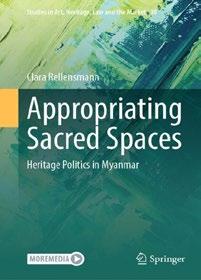
Appropriating Sacred Spaces: Heritage Politics in Myanmar
Clara Rellensmann
Springer Cham, 2024
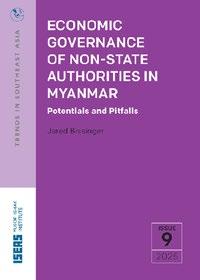
Economic Governance of Non-State Authorities in Myanmar: Potentials and Pitfalls
Jared Bissinger
ISEAS – Yusof Ishak Institute, 2025
In Burmese, the acronym Ma Aye Lo is a play on words based on the initials of the putschist general Min Aung Hlain and the slang expression “f**k your mother.”
On December 31, eleven months after the coup of February 1, 2021, murmured in unison in the darkness of the night, a resounding Ma Aye Lo rises from the windows and spreads across the country.
A warning, in a way, against a junta that is both torturous and paternalistic and proclaims itself “father and mother of the nation”: “Min Aung Hlaing, you fuck your mother,” meaning our “motherland.”
To document this, a multi-site approach was chosen—in France, Burma, and Thailand—with displaced people, exiles,
The book provides deep insights into heritage politics in Myanmar on the basis of the conservation history of Bagan and its entanglement in national politics. It particularly investigates the heritage practice of the dictatorial regime that ruled Myanmar from 1988 to 2011 and highlights the implications of both the reconciliation politics of Aung San Suu Kyi’s NLD government (20162020) and the UNESCO World Heritage System.
The book examines the function of Bamar-Buddhist architecture in the spatial strategy of the 1988-2011 regime and its nation-building efforts. With a focus on the historic site of Bagan, included on the World Heritage List in 2019, and the “Adopt-a-Pagoda Program” that was implemented at the site
Since Myanmar’s 2021 military coup, the reach and influence of non-state authorities have spread considerably, providing them with greater scope to govern economic activity in parts of Myanmar. Taxation is among non-state authorities’ most widespread aspects of economic governance. Numerous groups rely on checkpoints and road tolls, with other common taxes covering natural resource extraction, and agricultural production. Numerous groups have authority over aspects of trade, and some have either stated policies or informal engagement with foreign investors. Non-state authorities face challenges in governing economic activities. While some non-state authorities are focused
refugees, and stateless people. Crossexamining the notions of internal war, respect mixed with fear, undesirability, this volume offers a broader introspection of the very conditions of survival constituting contemporary migrations and questions the resilience of an “undesired” population in its own country.
from 1995 to 2011 under authoritarian rule, it provides a detailed account of Bagan’s physical transformation and its political significance for national politics at the time. It offers a historical comparison of the heritage politics of Myanmar’s most recent transitional governments (2011-2020) pointing out the particularities of the country’s institutionalized heritage practice and one-sided nation-building strategy. Both have contributed to continued ethnic conflicts that are generally considered to be the world’s longest civil war. In the renewed dictatorial context of Myanmar since February 1, 2021, the volume helps to understand the roots of the new regime’s heritage practice and national imagination.
on governing economic activities, others are focused on doing business—including illicit business—and have little interest in governing. Collaboration to develop and implement joint quasi-federal governance for national-level economic powers, such as trade, has been limited. This raises questions about whether Myanmar’s non-state authorities can offer a viable national-level alternative to the State Administration Council (SAC), or whether they constitute an alternative only for some subnational areas and powers.
